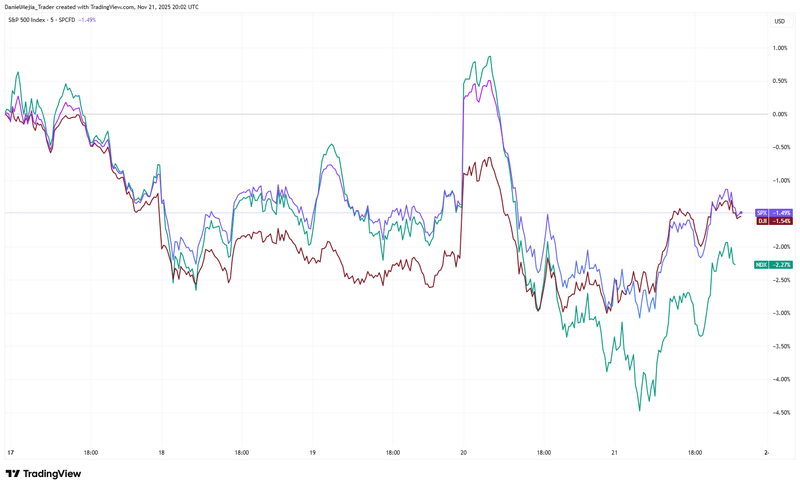US markets lift despite growing uncertainty over inflation data
US equity markets staged a sizeable intraday recovery despite the Bureau of Labor Statistics announcing that October’s consumer-price index will not be published and that November’s CPI release will be delayed. The data gap increases uncertainty for the Federal Reserve ahead of its policy decision, prompting markets to place greater weight on private indicators.

The Bureau of Labor Statistics cancelled the October CPI owing to unavailable source data and postponed the November release from 10 December to 18 December, creating an information shortfall for the Fed.
Following the announcement, markets pushed up the implied probability of a December rate cut, and the major US indices rebounded sharply from earlier losses.
UK retail sales and PMI prints were softer than needed to reassure markets, yet sterling and the FTSE 100 moved modestly higher on the day.
Japan’s headline and core inflation accelerated to c. 3.0 per cent, supporting yen strength amid renewed debate about monetary policy divergence between Tokyo and other central banks.
The BLS cancels the October CPI release
The US Bureau of Labor Statistics (BLS) said it will not publish the Consumer Price Index for October because crucial survey inputs could not be collected during the recent government shutdown. In addition, the BLS confirmed that the November CPI — originally scheduled for 10 December — will be issued on 18 December, after the Federal Reserve’s policy meeting on 10 December.
The timing of that delay is significant. Fed Chair Jerome Powell has said policymakers will consider all available information, including private-sector measures, but official statistics are normally the central reference for deliberations. The absence of timely CPI data therefore increases the uncertainty surrounding the FOMC’s decision. In the immediate aftermath of the announcement, market-implied odds of a 25-basis-point cut in December rose materially (per the CME Group’s FedWatch Tool), and investors pushed equities higher as expectations for easing increased.
US equity performance reflected that reaction: the S&P 500 rose c. 1.17 per cent to about 6,625 points, the Nasdaq gained c. 1.50 per cent to c. 24,405, and the Dow Jones advanced c. 1.24 per cent to roughly 46,320. Despite the rally, all three indices remained negative on the week after previous declines exceeding 1 per cent.

Figure 1. S&P 500, Nasdaq-100 and Dow Jones — weekly performance. Source: Nasdaq and NYSE; Figure obtained from TradingView.
UK retail sales and PMI show soft improvement but mixed signals
Data from the Office for National Statistics (ONS) painted a mixed picture for the UK. Year-on-year retail sales growth slowed from 1.0 per cent to 0.2 per cent, reflecting a monthly decline of 1.1 per cent. On the activity front, S&P Global’s PMI suite returned expansionary readouts for October: manufacturing PMI was 50.2 and services PMI 50.5 — both above the 50 threshold but with services below the market consensus of c. 52.
The combination of subdued retailing and tepid PMIs underscores the balancing act facing the Bank of England: inflation remains elevated while domestic demand and productivity exhibit signs of fragility. Nonetheless, sterling experienced a modest appreciation of c. 0.29 per cent against the US dollar to about USD 1.3107, and the FTSE 100 added c. 0.13 per cent to approximately 9,539, as market participants priced in the evolving global policy mix.
Japanese inflation edges higher, supporting the yen
Japan’s Ministry of Internal Affairs and Communications reported a slight acceleration in both headline and core consumer-price inflation to c. 3.0 per cent year-on-year. The persistence of price pressure complicates the policy outlook for the Bank of Japan, even as the new government signals an emphasis on growth.
In FX markets the yen strengthened: USD/JPY fell, with the quoted level around 156.39, representing a c. 0.68 per cent appreciation of the yen on the day. Equity markets were less favourable: the Nikkei 225 closed down c. 2.40 per cent at about 48,625, as investors recalibrated valuations in light of tighter inflation dynamics and the potential for a less accommodative BoJ stance.
